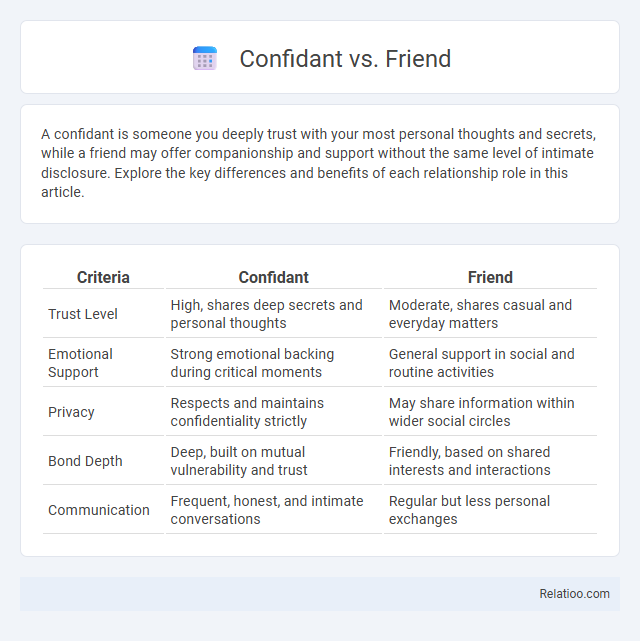A confidant is someone you deeply trust with your most personal thoughts and secrets, while a friend may offer companionship and support without the same level of intimate disclosure. Explore the key differences and benefits of each relationship role in this article.
Table of Comparison
| Criteria | Confidant | Friend |
|---|---|---|
| Trust Level | High, shares deep secrets and personal thoughts | Moderate, shares casual and everyday matters |
| Emotional Support | Strong emotional backing during critical moments | General support in social and routine activities |
| Privacy | Respects and maintains confidentiality strictly | May share information within wider social circles |
| Bond Depth | Deep, built on mutual vulnerability and trust | Friendly, based on shared interests and interactions |
| Communication | Frequent, honest, and intimate conversations | Regular but less personal exchanges |
Understanding the Difference: Confidant vs Friend
A confidant is someone you trust implicitly with your deepest secrets and personal thoughts, offering emotional support without judgment. A friend may share enjoyable experiences and casual conversations but does not always hold the same level of trust or intimacy as a confidant. Understanding the difference empowers you to recognize which relationships provide emotional security versus social connection.
Defining Friendship: What Makes Someone a Friend?
Friendship is defined by mutual trust, emotional support, and consistent companionship, distinguishing a friend from a mere acquaintance. A confidant specifically refers to someone entrusted with personal secrets and private thoughts, highlighting a deeper level of intimacy and discretion. Unlike general friends, confidants serve as reliable listeners who provide guidance without judgment, reinforcing the fundamental elements that make a relationship truly meaningful.
The Unique Role of a Confidant in Your Life
A confidant holds a unique role by providing a safe space for sharing personal thoughts and feelings without judgment, fostering deeper trust than typical friendships. Unlike casual friends, a confidant offers unwavering support and discretion, crucial for emotional well-being and personal growth. This intimate connection enriches life by promoting vulnerability, honesty, and a profound sense of security.
Trust and Vulnerability: Key Elements of a Confidant
Trust forms the foundation of a confidant relationship, where deep vulnerability is shared without fear of judgment or betrayal. Unlike a casual friend, a confidant holds sensitive information with discretion, offering emotional support and reliability during challenging times. This mutual trust and willingness to be vulnerable differentiate a confidant from a friend or acquaintance, fostering a uniquely intimate bond.
Depth of Connection: Surface Friends vs Deep Confidants
Surface friends often engage in casual conversations and shared activities without revealing personal struggles, while deep confidants provide a trusted space for emotional vulnerability and complex disclosures. Your relationship with a confidant is characterized by mutual trust, empathy, and the willingness to offer support during challenging times, creating a far deeper connection than typical friendships. The depth of connection in confidant relationships fosters personal growth and resilience through authentic communication.
Emotional Support: How Confidants Differ from Friends
Confidants provide deeper emotional support than typical friends by offering unwavering trust and discretion, creating a safe space for sharing vulnerabilities without fear of judgment. While friends may offer companionship and general advice, your confidant listens attentively and supports your emotional well-being with empathy and understanding. This unique bond fosters emotional resilience and promotes mental clarity by ensuring your most personal concerns remain protected.
Lifelong Bonds: Are Confidants Rare Compared to Friends?
Confidants are rare compared to friends because they involve a deeper level of trust and emotional intimacy, often sharing personal secrets and vulnerabilities that few people access. While friendships can be numerous and varied, lifelong bonds with confidants require consistent mutual understanding, loyalty, and emotional support. Your closest relationships often depend on having a few treasured confidants rather than many casual friends.
Identifying a Confidant Among Your Friends
A confidant is a trusted individual with whom you share your deepest thoughts and feelings, distinct from a regular friend who may not offer the same level of emotional security. Identifying a confidant among your friends involves recognizing those who demonstrate unwavering trustworthiness, active listening, and genuine empathy in your interactions. Your true confidant supports your vulnerability without judgment, creating a safe space for honest and meaningful communication.
Building and Maintaining Trust with a Confidant
Building and maintaining trust with a confidant involves consistent honesty, active listening, and respecting confidentiality, which distinguishes this relationship from a casual friendship. Unlike general friends, confidants serve as trusted individuals with whom sensitive personal information can be safely shared and preserved. Cultivating such a bond requires vulnerability, mutual understanding, and reliability to ensure a secure, supportive connection.
When Friendship Evolves into a Confidant Relationship
Friendship evolves into a confidant relationship when trust deepens, allowing for the sharing of personal secrets and vulnerabilities beyond casual interaction. A friend provides companionship and support, while a confidant becomes a trusted individual who offers emotional safety and discreet counsel. This transition signifies a stronger bond characterized by mutual understanding and confidentiality.

Infographic: Confidant vs Friend
 relatioo.com
relatioo.com